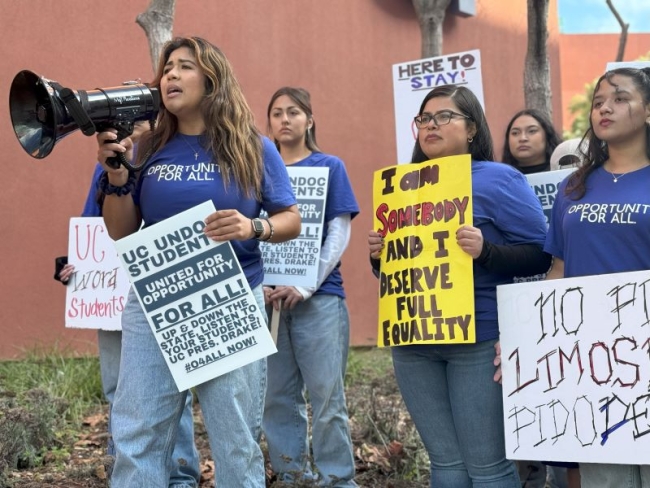You have /5 articles left.
Sign up for a free account or log in.

Undocumented students announced a hunger strike outside the UC Board of Regents meeting at the University of California, San Francisco, Tuesday.
Hayley Burgess
A group of at least 20 undocumented students enrolled at University of California campuses launched a hunger strike Tuesday to coincide with a three-day Board of Regents meeting this week.
The goal was to pressure the board to move forward with a delayed plan that would open campus job opportunities, such as paid research opportunities and teaching assistantships, to undocumented students. The board ultimately voted Thursday to delay implementation of the policy for a year.
The decision was a blow to students and advocates who’d pushed for it and hoped UC system officials would follow through on their past statements of support for the plan.
A 1986 federal law prohibits employers from hiring undocumented immigrants, which places a financial hardship on undocumented students, who also don’t qualify for federal financial aid. The plan under consideration by the board is based on a legal theory by the Center for Immigration Law and Policy at UCLA. The theory suggests that the law barring employers from hiring undocumented immigrants doesn’t apply to states or state entities, such as public universities.
“Our university let us down today,” Jeffry Umaña Muñoz, a fourth-year student at UCLA, said in a press release from the center. “Our demand was simple and clear: we want equal access to employment opportunities on campus so that we aren’t relegated to a second class UC experience. Our classmates can apply for any job on campus, helping them not only get by financially on a daily basis but also advancing their careers, while we remain forced to rely on incredibly limited resources.”
Carmen Avendano, a third-year transfer student at UCLA, said the group decided a hunger strike would be fitting, because without access to financial resources that other students have, “many of us share that we have gone through hunger involuntarily, but this time we do it voluntarily, putting our bodies on the line to prove a point to them.”
She said Thursday, ahead of the board’s decision, that she had started to feel “nauseous and light-headed” that morning and “couldn’t hold any liquids down.”
Karen Ruiz Diaz, a fourth-year student at UCLA, said prior to the board vote that the group’s energy was “running low, but we’re trying to uplift our community, uplift each other and just stay optimistic.”
It’s unclear if the students will continue their hunger strike.
The motion to delay the implementation of the policy stoked significant debate among UC leaders and regents. Some regents and Dr. Michael V. Drake, president of the UC system, recommended the plan be put on pause.
“We have concluded that the proposed legal pathway is not viable at this time and in fact carries significant risk for the institution and those we serve,” Drake said at the board meeting. “For that reason it is inadvisable for the university to initiate implementation right now. Nevertheless, we remain committed to continuing to explore our options. As new information becomes available, we will evaluate that information, and if appropriate, move ahead.”
Others, including Regent John A. Perez, responded that the system owed it to undocumented students to move forward.
“I can’t think of a moment where I’ve been more disappointed sitting around this board table,” he said.
New Legal Theory Meets Setbacks
Scholars who drafted the legal theory undergirding the proposed plan argue that a 1996 congressional amendment to the law specified that it applies to “an entity in any branch of the Federal Government” but notably doesn’t include states.
Faculty co-directors of the immigration law and policy center issued a 2022 memo detailing their theory, signed by 29 constitutional and immigration law scholars, including Erwin Chemerinsky, dean of the UC Berkeley School of Law.
The Board of Regents created a working group in May 2023 to consider the proposal and come up with a plan for how the system should proceed on the issue by the end of November. The move was in response to advocacy by the drafters of the legal theory, undocumented students and supporters of the policy, known as the Opportunity for All campaign.
However, when November came around, Drake announced at a regents meeting that system leaders needed more time.
Complicating matters, U.S. Department of Homeland Security officials have urged system leaders not to move forward with the plan because of the challenge it would pose to federal law and the Biden administration, Politico reported Wednesday. Republican state representative Darrell Issa also wrote a letter to Governor Gavin Newsom opposing the plan.
“Fundamentally, the State of California and the University of California cannot simply pick and choose which federal laws to follow and which to declare null and void,” Issa wrote.
An estimated 4,000 undocumented students are enrolled in the UC system. The Deferred Action for Childhood Arrivals program, or DACA, an Obama-era program that protects immigrants brought to the U.S. as children from deportation, allows recipients to work in the U.S. legally. However, not all undocumented students have DACA status, and the number of students without DACA is growing because recent court rulings currently prevent new applications to the program.
Drake argued in the meeting that employing undocumented students is the “right thing to do” but could risk them facing “criminal prosecution,” deportation and changes to their immigration status. He added that human resources and legal professionals could also be subject to prosecution and the institution could be subject to “civil fines, criminal penalties or debarment from federal contracting” if the system is found in violation of federal law.
Regent Gregory Sarris pushed back on that line of thinking.
“For us to sit here and be so concerned and keep talking about risk when the students and their families have gone through so much risk just to get here only can strike me as patronizing,” he said at the meeting.
Ahilan Arulanantham, professor from practice at the UCLA School of Law and faculty co-director of the immigration law center, doesn’t buy the idea that the proposal is too complicated to implement. He noted that he and his colleagues sent system leaders a proposed implementation plan in November after extensive conversations with various legal experts and human resources staff members.
“Any significant change to the HR systems of a university of this size is going to be somewhat complex, and you have to understand the intersection of employment law, tax law, immigration law and the HR systems for this system of tens of thousands of people,” he said.
Arulanantham believes experts helped to iron out those complexities in a way that the plan could be implemented within a couple months. He noted that the proposal also enjoys widespread faculty support. A December letter to system leaders signed by at least 500 professors advocated for the go-ahead to hire undocumented students.
“We write for two related reasons: to express our support in the strongest possible terms for the campaign by undocumented students to obtain equal educational opportunities at the UC … and to make clear that we will hire undocumented students into educational employment positions for which they are qualified once given authority to do so by the UC,” the letter reads.
Arulanantham said he felt “torn” about the hunger strike, because he worries for students’ well-being.
“They’re adults, obviously, but it makes me nervous,” he said. “At the same time, I admire them. I admire their courage. I understand why they’re doing it.”
Umaña Muñoz said in the press release that he was “deeply disappointed that the UC Regents and President Drake shirked their duties to the students they are supposed to protect and support.
“We as UC students deserve so much more from our university leadership,” he said. “This is not the end of our fight for equality.”









